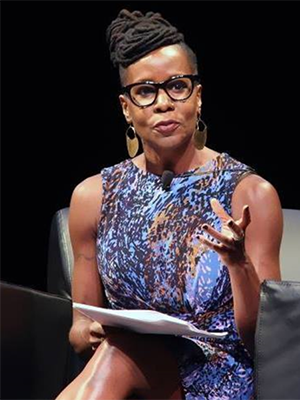Teaching Excellence at Yale
Encouraging bold inquiry helps students become independent thinkers.
Aimee Meredith Cox, Associate Professor of Anthropology and African American Studies, stimulates student inquiry in ANTH 442: Theory and Methods of Performance Ethnography. “I find that my students learn best when I’m encouraging their questions and then thinking alongside them,” said Cox. For performance ethnography, a field that renders social and personal data artistically for audiences to consider, this approach is particularly appropriate. “I invite students to partner with me in shaping class inquiry,” said Cox, “enabling them to cultivate anthropological methods in pursuit of complex questions that matter to their lives.”

One of Cox’s students created a soundscape that traced her family’s shifting vocal patterns while migrating to the United States. The student used ethnographic speech theory and the rigors of artistic expression to articulate meaningful, creative knowledge about immigration that her peers could analyze. Inquiries like this grow from Cox’s exploratory approach, where students use readings and discussion to discover ethnographic methods and research topics that interest them. “I’ve recently stopped defining terms for students, instead guiding them to use theory, practice, and discussion to construct their own understanding,” Cox said. “As their knowledge develops and grows, so does their enthusiasm. This enthusiasm then funds a willingness to explore and create new avenues into complex questions.”
Such decentered teaching encourages students to consider how the practices and tools of the field can open up relevant, contemporary issues in their own lives. Another student crafted a photography-based play about her family’s experiences living in Pittsburgh, studying the theories behind photography and documentary in order to render urban life in newly readable ways for others. The project made the lives of others visible for students while permitting rich self-reflection.
Cox’s approach reveals how empowering student inquiry can lead to effective learning. By allowing students to “run with questions,” Cox builds scholarly potential, teaches research methods, and in her words, “helps students find new ways to express the realities of their lives and empathize with those of others.”
Research and resources exploring the effectiveness of student-led inquiry:
José Luis Zafra-Gómez, Senior Lecturer in Accounting at Granada University, Spain, et. al explore how inquiry-based learning encourages students to take effective control of their learning while improving their knowledge of the subject. Read the study “Measuring the Impact of Inquiry-Based Learning on Outcomes and Student Satisfaction” in Assessment and Evaluation in Higher Education.
Jennifer Kreps Frisch, Associate Professor in Education at the University of Minnesota Duluth, et. al explore how student-driven inquiry can improve student engagement in class and analysis of science content. Read the study “Transforming Undergraduate Biology Learning with Inquiry-Based Instruction” in the Journal of Computing in Higher Education.
Yale’s Center for Teaching and Learning offers a webpage resource exploring the ways in which students learn by constructing their own approach to knowledge and pursuing complex questions.
Share with us or a colleague:
View or download a PDF version below. Send us your feedback and suggestions. To opt-out/opt-in to this newsletter, please visit Yale’s messaging service website and follow the on-screen instructions (see instructions in the sidebar above).
